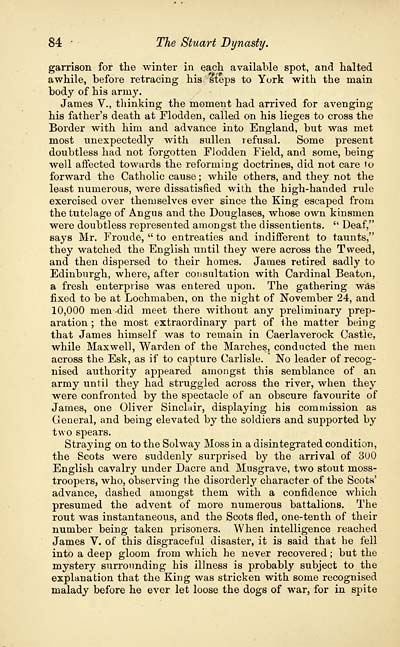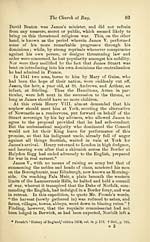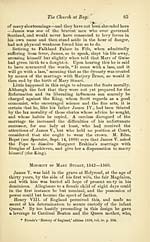Stuart dynasty
(104) Page 84
Download files
Complete book:
Individual page:
Thumbnail gallery: Grid view | List view

84 ■ The Stuart Dynasty.
garrison for the winter in each available spot, and halted
awhile, before retracing his ' steps to York with the main
body of his army.
James V., thinking the moment had arrived for avenging
his father's death at Flodden, called on his lieges to cross the
Border with him and advance into England, but was met
most unexpectedly with sullen refusal. Some present
doubtless had not forgotten FJodden Field, and some, being
well affected towards the reforming doctrines, did not care to
forward the Catholic cause ; while others, and they not the
least numerous, were dissatisfied with the high-handed rule
exercised over themselves ever since the King escaped from
the tutelage of Angus and the Douglases, whose own kinsmen
were doubtless represented amongst the dissentients. " Deaf,"
says Mr. Froude, " to entreaties and indifferent to taunts,"
they watched the English until they were across the Tweed,
and then dispersed to their homes. James retired sadly to
Edinburgh, where, after consultation with Cardinal Beaton,
a fresh enterprise was entered upon. The gathering was
fixed to be at Lochmaben, on the night of November 24, and
10,000 men -did meet there without any preliminary prep-
aration ; the most extraordinary part of the matter being
that James himself was to remain in Caerlaverock Castle,
while Maxwell, Warden of the Marches, conducted the men
across the Esk, as if to capture Carlisle. No leader of recog-
nised authority appeared amongst this semblance of an
army until they had struggled across the river, when they
were confronted by the spectacle of an obscure favourite of
James, one Oliver Sinclair, displaying his commission as
Ceneral, and being elevated by the soldiers and supported by
two spears.
Straying on to the Sol way Moss in a disintegrated condition,
the Scots were suddenly surprised by the arrival of 300
English cavalry under Dacre and Musgrave, two stout moss-
troopers, who, observing the disorderly character of the Scots'
advance, dashed amongst them with a confidence which
presumed the advent of more numerous battalions. The
rout was instantaneous, and the Scots fled, one-tenth of their
number being taken prisoners. When intelligence reached
James V. of this disgraceful disaster, it is said that he fell
into a deep gloom from which he never recovered ; but the
mystery surrounding his illness is probably subject to the
explanation that the King was stricken with some recognised
malady before he ever let loose the dogs of war, for in spite
garrison for the winter in each available spot, and halted
awhile, before retracing his ' steps to York with the main
body of his army.
James V., thinking the moment had arrived for avenging
his father's death at Flodden, called on his lieges to cross the
Border with him and advance into England, but was met
most unexpectedly with sullen refusal. Some present
doubtless had not forgotten FJodden Field, and some, being
well affected towards the reforming doctrines, did not care to
forward the Catholic cause ; while others, and they not the
least numerous, were dissatisfied with the high-handed rule
exercised over themselves ever since the King escaped from
the tutelage of Angus and the Douglases, whose own kinsmen
were doubtless represented amongst the dissentients. " Deaf,"
says Mr. Froude, " to entreaties and indifferent to taunts,"
they watched the English until they were across the Tweed,
and then dispersed to their homes. James retired sadly to
Edinburgh, where, after consultation with Cardinal Beaton,
a fresh enterprise was entered upon. The gathering was
fixed to be at Lochmaben, on the night of November 24, and
10,000 men -did meet there without any preliminary prep-
aration ; the most extraordinary part of the matter being
that James himself was to remain in Caerlaverock Castle,
while Maxwell, Warden of the Marches, conducted the men
across the Esk, as if to capture Carlisle. No leader of recog-
nised authority appeared amongst this semblance of an
army until they had struggled across the river, when they
were confronted by the spectacle of an obscure favourite of
James, one Oliver Sinclair, displaying his commission as
Ceneral, and being elevated by the soldiers and supported by
two spears.
Straying on to the Sol way Moss in a disintegrated condition,
the Scots were suddenly surprised by the arrival of 300
English cavalry under Dacre and Musgrave, two stout moss-
troopers, who, observing the disorderly character of the Scots'
advance, dashed amongst them with a confidence which
presumed the advent of more numerous battalions. The
rout was instantaneous, and the Scots fled, one-tenth of their
number being taken prisoners. When intelligence reached
James V. of this disgraceful disaster, it is said that he fell
into a deep gloom from which he never recovered ; but the
mystery surrounding his illness is probably subject to the
explanation that the King was stricken with some recognised
malady before he ever let loose the dogs of war, for in spite
Set display mode to:
![]() Universal Viewer |
Universal Viewer | ![]() Mirador |
Large image | Transcription
Mirador |
Large image | Transcription
Images and transcriptions on this page, including medium image downloads, may be used under the Creative Commons Attribution 4.0 International Licence unless otherwise stated. ![]()
| Histories of Scottish families > Stuart dynasty > (104) Page 84 |
|---|
| Permanent URL | https://digital.nls.uk/94819014 |
|---|
| Description | A selection of almost 400 printed items relating to the history of Scottish families, mostly dating from the 19th and early 20th centuries. Includes memoirs, genealogies and clan histories, with a few produced by emigrant families. The earliest family history goes back to AD 916. |
|---|

